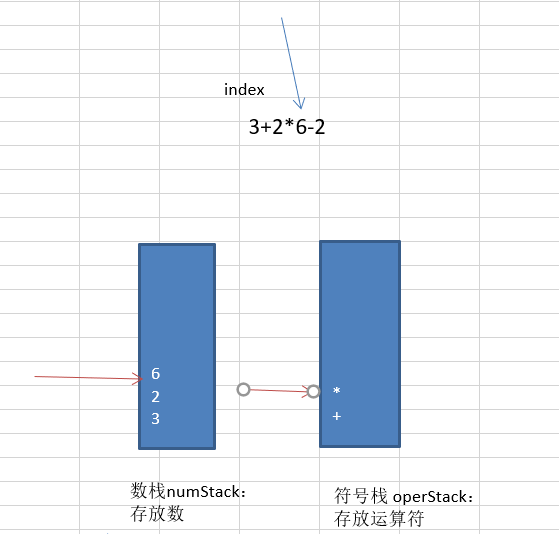使用栈完成计算 一个表达式的结果

对计算机而言,它接收到的就是一个字符串
使用栈完成表达式的计算 思路
- 通过一个 index 值(索引),来遍历我们的表达式
- 如果我们发现是一个数字, 就直接入数栈
- 如果发现扫描到是一个符号, 就分如下情况
- 如果发现当前的符号栈为 空,就直接入栈
- 如果符号栈有操作符,就进行比较,如果当前的操作符的优先级小于或者等于栈中的操作符, 就需要从数栈中pop出两个数,在从符号栈中pop出一个符号,进行运算,将得到结果,入数栈,然后将当前的操作符入符号栈, 如果当前的操作符的优先级大于栈中的操作符, 就直接入符号栈.
- 当表达式扫描完毕,就顺序的从 数栈和符号栈中pop出相应的数和符号,并运行.
- 最后在数栈只有一个数字,就是表达式的结果
验证: 3+2*6-2 = 13

这时-号优先级低于*,就需要从数栈中pop出两个数,在从符号栈中pop出一个符号,进行运算,将得到结果,入数栈,然后将当前的操作符入符号栈


当表达式扫描完毕,就顺序的从 数栈和符号栈中pop出相应的数和符号,并运行.


代码实现
1
2
3
4
5
6
7
8
9
10
11
12
13
14
15
16
17
18
19
20
21
22
23
24
25
26
27
28
29
30
31
32
33
34
35
36
37
38
39
40
41
42
43
44
45
46
47
48
49
50
51
52
53
54
55
56
57
58
59
60
61
62
63
64
65
66
67
68
69
70
71
72
73
74
75
76
77
78
79
80
81
82
83
84
85
86
87
88
89
90
91
92
93
94
95
96
97
98
99
100
101
102
103
104
105
106
107
108
109
110
111
112
113
114
115
116
117
118
119
120
121
122
123
124
125
126
127
128
129
130
131
132
133
134
135
136
137
138
139
140
141
142
143
144
145
146
147
148
149
150
151
152
153
154
155
156
157
158
159
160
161
162
163
164
165
166
167
168
169
170
171
172
173
174
175
176
177
178
179
180
181
182
183
184
185
186
187
188
189
190
| public class Calculator {
public static void main(String[] args) {
String expression = "7*2*2-5+1-5+3-4";
ArrayStack2 numStack = new ArrayStack2(10);
ArrayStack2 operStack = new ArrayStack2(10);
int index = 0;
int num1 = 0;
int num2 = 0;
int oper = 0;
int res = 0;
char ch = ' ';
String keepNum = "";
while(true) {
ch = expression.substring(index, index+1).charAt(0);
if(operStack.isOper(ch)) {
if(!operStack.isEmpty()) {
if(operStack.priority(ch) <= operStack.priority(operStack.peek())) {
num1 = numStack.pop();
num2 = numStack.pop();
oper = operStack.pop();
res = numStack.cal(num1, num2, oper);
numStack.push(res);
operStack.push(ch);
} else {
operStack.push(ch);
}
}else {
operStack.push(ch);
}
} else {
keepNum += ch;
if (index == expression.length() - 1) {
numStack.push(Integer.parseInt(keepNum));
}else{
if (operStack.isOper(expression.substring(index+1,index+2).charAt(0))) {
numStack.push(Integer.parseInt(keepNum));
keepNum = "";
}
}
}
index++;
if (index >= expression.length()) {
break;
}
}
while(true) {
if(operStack.isEmpty()) {
break;
}
num1 = numStack.pop();
num2 = numStack.pop();
oper = operStack.pop();
res = numStack.cal(num1, num2, oper);
numStack.push(res);
}
int res2 = numStack.pop();
System.out.printf("表达式 %s = %d", expression, res2);
}
}
class ArrayStack2 {
private int maxSize;
private int[] stack;
private int top = -1;
public ArrayStack2(int maxSize) {
this.maxSize = maxSize;
stack = new int[this.maxSize];
}
public int peek() {
return stack[top];
}
public boolean isFull() {
return top == maxSize - 1;
}
public boolean isEmpty() {
return top == -1;
}
public void push(int value) {
if(isFull()) {
System.out.println("栈满");
return;
}
top++;
stack[top] = value;
}
public int pop() {
if(isEmpty()) {
throw new RuntimeException("栈空,没有数据~");
}
int value = stack[top];
top--;
return value;
}
public void list() {
if(isEmpty()) {
System.out.println("栈空,没有数据~~");
return;
}
for(int i = top; i >= 0 ; i--) {
System.out.printf("stack[%d]=%d\n", i, stack[i]);
}
}
public int priority(int oper) {
if(oper == '*' || oper == '/'){
return 1;
} else if (oper == '+' || oper == '-') {
return 0;
} else {
return -1;
}
}
public boolean isOper(char val) {
return val == '+' || val == '-' || val == '*' || val == '/';
}
public int cal(int num1, int num2, int oper) {
int res = 0;
switch (oper) {
case '+':
res = num1 + num2;
break;
case '-':
res = num2 - num1;
break;
case '*':
res = num1 * num2;
break;
case '/':
res = num2 / num1;
break;
default:
break;
}
return res;
}
}
|





